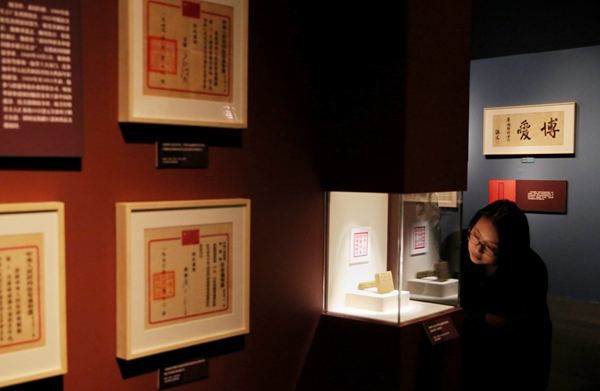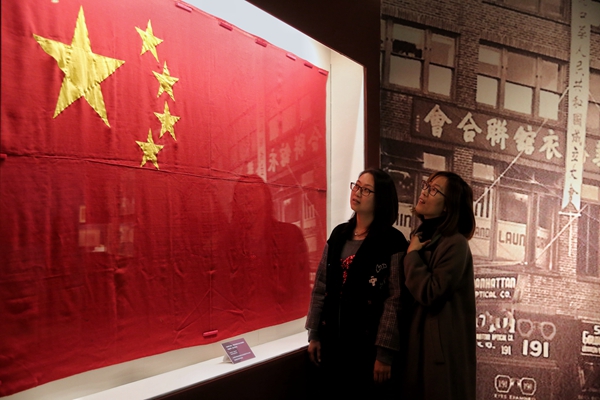Exhibition hails contribution of 'unsung' overseas Chinese
 0 Comment(s)
0 Comment(s) Print
Print E-mail China Daily, November 5, 2019
E-mail China Daily, November 5, 2019

An ongoing exhibition at the National Museum of China (through Nov 29) looks in detail at the devotion of overseas Chinese in contributing to the progress of their ancestral home, starting from the Xinhai Revolution that ended China's feudal monarchy in 1911.
Nearly 300 exhibits, including photos, letters, diaries, badges, historic documents and daily-use objects, are largely from the collection of the Overseas Chinese History Museum of China, while some were donated to the National Museum.
Chen Yongsheng from the All-China Federation of Returned Overseas Chinese says the first part of the exhibition title, xing yuan, literally meaning "traveling afar", illustrates "an emotional attachment between overseas Chinese and their land of descent" despite the geographic distance.
"The second part of the exhibition title, tong meng (a shared dream), expresses the common wish for the great rejuvenation of the Chinese nation," Chen says.
Chen's federation operates the Overseas Chinese History Museum of China, a national-themed museum opened in 2014 to trace the immigration history of the Chinese throughout centuries until today.
The museum has built up a collection of 32,000 exhibits, which are mostly donated by overseas Chinese communities, hoping their stories can be recounted to the wider population, Chen says.

The exhibition hails those prominent figures who returned to China from abroad, including Qian Xuesen, the late cyberneticist.
Qian, together with another 70 returned scientists and scholars, issued a written proposal in 1955, in which they talked about their work and life in China and motivated other Chinese expatriates in the United States to move back and join the construction of New China. A copy of this proposal is on show at the current exhibition.
Chen says the exhibition mostly introduces the deeds of unsung heroes of the returned overseas Chinese, such as Zheng Jia, who returned from Singapore and participated in scientific surveys in the Tibet autonomous region and Qinghai province for railway construction in the 1970s. A toolbox which Zheng carried with him during the surveys is a highlight of the exhibition.
Retired teacher, Qiu Yiming, 83, vividly recollects how he prepared for a journey to China 62 years ago, setting out from Indonesia, where he was born and raised.
Qiu, alongside dozens of students of Chinese origin, whom he taught at a middle school, boarded a steamer in Bandung in 1957. They were among many groups of young people who headed for the land of their ancestry with the hope and desire to build a new China.
The exhibition has a handwritten list made by Qiu of objects he thought would be needed in China, such as medicines, clothes and stationary.
"I also listed sweaters and woolen threads, because many students didn't realize that they needed something to keep them warm in a country which, unlike Indonesia, is not hot all the year around," Qiu says.
Between 1949 and 1968, more than 70,000 overseas Chinese in their teens and early 20s arrived on the mainland and continued to study, work and live, according to figures from the All-China Federation of Returned Overseas Chinese.
Qiu donated the list, together with the suitcase he carried, to the Overseas Chinese History Museum of China when it was founded.
"I want to leave something for the future generations. I hope they will learn of our experiences," he says.






Go to Forum >>0 Comment(s)